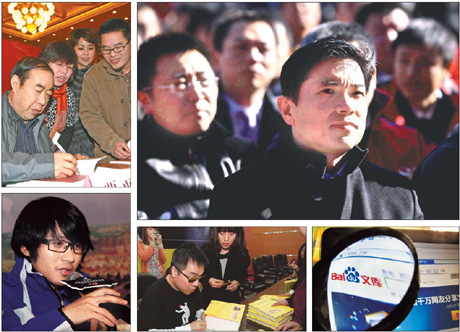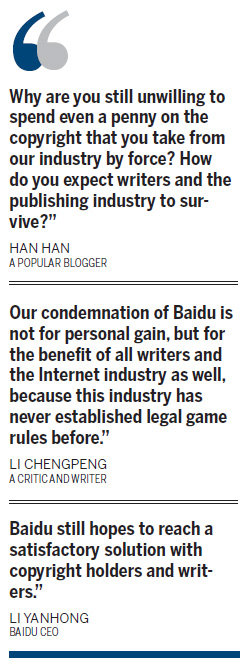Writers face uphill struggle to prove copyright infringement, report Qiu Bo, Duan Yan and Li Li in Beijing.
Huang Shan mechanically switches on a palm-size gadget as the subway train's door shuts. Ghost Fighter, Chapter Two. Another 40-minute journey to work, and a horror story is the best way to kill time.
"The electronic book is my favorite travel companion," said Huang, 27, an English teacher at a Beijing language training school. "I download e-books from the Internet for free."
 About 50 writers and publishers are fighting search engine giant Baidu over its use of their works without permission through the online library Baidu Wenku. Those who signed an open letter of complaint include novelist Jia Pingwa (top left), blogger Han Han (bottom left) and Hong Kong movie director Pang Ho-cheung (bottom center, seated). Baidu's chief executive, Li Yanhong (top right) said he hopes to work out a mutually beneficial settlement. Provided to China Daily |
Huang's free ride could end soon, amid increasing battles between copyright holders and content-providing websites. Digital piracy, after already extracting a heavy toll from the film, music and software industries, now has publishing in its crosshairs.
The latest row is between Baidu and a group of about 50 Chinese writers and publishers, including popular blogger Han Han, novelist Jia Pingwa and Hong Kong movie director Pang Ho-cheung.
The literary group signed and published a letter on March 15 claiming that the largest Chinese search engine provided their works for free download from its library, Baidu Wenku, without their permission.

Baidu Wenku, launched in 2009, allows its users to download and upload digital files for free. It is the uploaded files, submitted by users without filtering for copyright, that are proving most problematic.
The two sides negotiated on Thursday, but the talks broke down after 4.5 hours.
Baidu issued a statement on Saturday, apologizing for hurting "the feelings of some writers". It also promised to delete all rights-infringing materials over the following three days. The number of literary worksin thelibrarydropped from 2.8million before negotiations to 168 late Tuesday afternoon.
Shen Haobo, a publisher and one of the writers' representatives, told China Daily on Sunday that the writers refused to accept Baidu's apology because it did not admit the site had engaged in piracy.
Han had complained Saturday on his blog, in an open letter to Baidu CEO Li Yanhong, because Baidu had refused to admit any act of copyright infringement and because writers generally earn very little for their works.
"Why are you still unwilling to spendevena pennyon the copyright that you take from our industry by force?" he wrote. "How do youexpectwriters and the publishing industry to survive?"
Forbes magazine listed Li this month as the richest man in China with a fortune of $9.4 billion. Record companies have taken Baidu to court over a similar issue, claiming copyright infringement over its mp3 search service that allows users to easily find and download music for free.
Baidu was listed last May as one of the world's most notorious piracy sites by the Congressional International Anti-Piracy Caucus, a watchdog group formed by 70 US lawmakers.
At an annual IT leaders summit in Shenzhen on Monday, Baidu's Li publicly responded for the first time to the dispute. He said he'd had many sleepless nights, and that the public misunderstands the company's actions. Li said Baidu is stepping up anti-piracy efforts and hopes to work out a mutually beneficial business model to settle the current issue.
He also mentioned the possibility of shutting down Baidu Wenku. "I made myself very clear inside the company. If we can't manage this, then we will shut it down."
Protection model
Baidu's vice-president, Zhu Guang, told National Business Daily last week that Baidu intends to address the writers' and publishers' complaints with new technology in mid-April. It would allow Baidu to compare its database of copyright books against users' uploads, and to reject the pirated uploads by the public.
Authors said no to what they called the "Zhu Guang model" because it would require the copyright holders to upload their books to Baidu to provide the comparison copy. "This is a kidnapping of copyright holders, and we will never accept it," they wrote in a statement.
Wang Ziqiang, director of the copyright department of National Copyright Administration (NCA), told China Daily on Monday that NCA welcomed Baidu's action of removing pirated uploads and supported the authors' rights.
"This dispute cannot be solved simply with anger," Wang said. "If negotiations cannot solve the problem of piracy, we support the copyright holders to protect their rights in other ways, including taking the infringing party to court."
His deputy, WangZhicheng, said Monday that the department interviewed Baidu officials on the copyright dispute in late February and that it had delegated Beijing Municipal Bureau of Copyright to investigate further.
He called for companies to operate their businesses in a law-abiding and honest way, and said they should not abuse the so-called safe harbor rules within the Protection of the Right to Online Dissemination of Information. Promulgated in 2006, the rules say that when a service provider unintentionally facilitates pirated contents but deletes them after being notified, it will not be liable for compensation.
Proof is difficult
Despite the NCA's support on the authors' copyright protection efforts, legal experts said it would be difficult to collect enough evidence to win a lawsuit against Baidu if the authors decided to file one.
"Under the rule, if Baidu was under clear knowledge that the content was uploaded without permission and didn't remove the content, then it would be considered a contributory infringer," Wang Qian, a professor at the Intellectual Property School of East China University of Political Science and Law, told China Daily.
"Compared with films, the copyright infringement of literary works is much more difficult to determine. Most copyright holders usually would not authorize an individual to upload their video contents online for free, and it is easy to detect a video longer than 40 minutes.
"It is not so easy for Baidu to find an infringing article upload by a user because many grassroot writers have voluntarily submitted their works online," Wang said.
In 2009, Google was accused of scanning 17,922 works by 570 Chinese authors and uploading them to its digital library. Google made immediate apologies. It promised to compensate with at least $60 for each book and to share 63 percent of the online reading profit with each author. Many authors rejected the offer.
The cases aren't the same, Wang said. "Google scanned the authors' books first and then uploaded them to the Internet, which constitutes a direct copyright infringement. But Baidu is merely allowing the Internet users to share their resources. Baidu will not be held liable unless it knows or has reason to know that the works uploaded by users are infringing."
Huang Hua, a copyright expert with Beijing-based Wowa Media Co, said a key issue would be whether Baidu has profited from making the written works available. Baidu has said it provides the platform for free, so a profit would be hard to prove.
Wang said Baidu Wenku - part of one of the most visited websites in the world - has generated numerous visits, and that leads to other gains, such as advertising fees and rising stock price, but it's hard to collect the evidence.
Whose profit?
In 2009, Shanda Literature, one of the largest literary work website networks in China, sued Baidu, claiming it was encroaching on its contracted writers' copyright royalties.
The case, in a Shanghai court, is still in the evidence exchange phase.
"Over 95 percent of our best-seller novels can be found in Baidu Wenku," Hou Xiaoqiang, Shanda's chief executive officer, said during an earlier interview with China Business, a financial newspaper. "We lose more than a billion yuan because of Baidu's piracy."
Hou said Saturday on his micro blog that he was happy to see that Baidu had acted so quickly in deleting suspected pirated documents. Nearly five months ago, he posted: "China's original literature is going to die if Baidu Wenku continues to exist."
At least one of Baidu's business partners doesn't seem worried.
Baidu is the exclusive content provider for a new e-reader released last month by consumer electronics brand Aigo. Sales of the e-reader have continued, despite the quick drop in the number of documents available on Baidu Wenku, according to an employee who answered Aigo's service hotline on Monday.
The authors asked Baidu to terminate its cooperation with Aigo during the negotiation. Baidu declined.
Li Chengpeng, a critic and writer, was in the original group of 50 but withdrew from the negotiation. Li told China Daily he is still actively involved in the dispute against Baidu.
"Our condemnation of Baidu is not for personal gain," he said, "but for the benefit of all writers and the Internet industry as well, because this industry has never established legal game rules before."